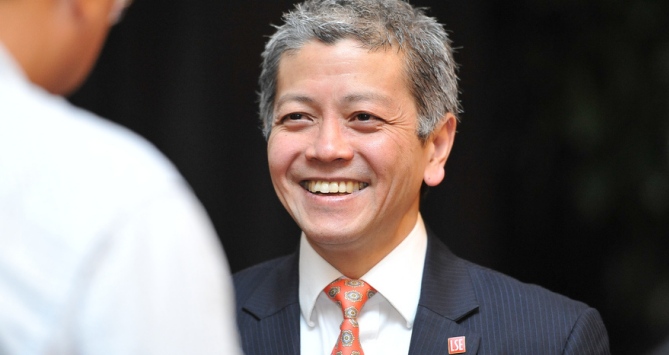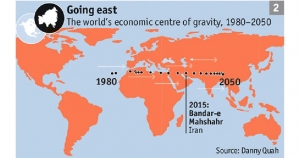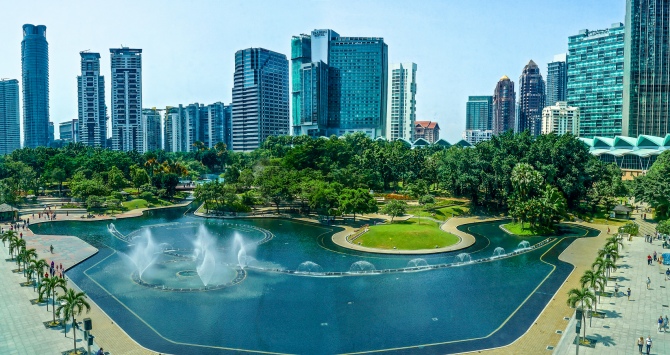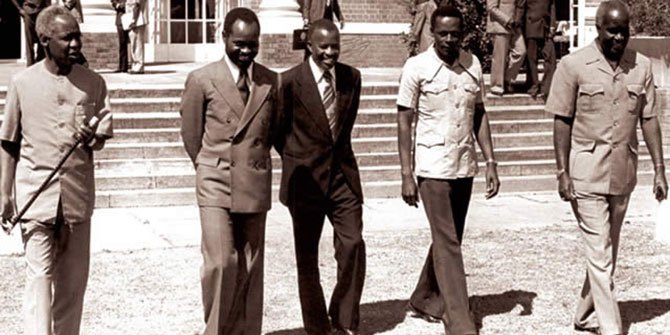Malaysia has gone rogue – with a corrupt political elite, a compromised judiciary, an electoral process that isn’t working, and a system that punishes whistle-blowers, says LSE’s Danny Quah. (Originally published by The Diplomat.)

In 1971, more than forty years before the world would turn its attention to the so-called one percent and the problem of income inequality, Malaysia embarked on one of history’s boldest and most noble experiments to reduce social disparity. Malaysia’s New Economic Policy, or NEP, would seek to “eradicate poverty for all” and “eliminate identification of race by economic function and geographic location.”
This polity that had achieved national independence just over a decade before, this country that was still a low-income emerging economy, was setting out to solve the massive problem of injustice and inequality over which other societies much more mature continued to struggle.
Malaysia was a democracy that hewed to the rule of law. The NEP would be Malaysia’s key political driver. Over the decades that followed, the NEP’s mantra would serve as a backdrop to almost all political discourse in the country. NEP-themed policies would, among much else, flesh out the concept of Bumiputera – an ethnic-driven formulation of native peoples in Malaysia.
It is difficult to grow an economy – look at train wrecks strewn around the world. But seeking to do so and at the same reduce ethnic- and rural-urban inequality, and maintain social harmony among diverse ethnic and religious groups is an order of magnitude more arduous. Malaysia succeeded. From tropical jungle, Malaysia has grown to have an average income now well above the world emerging-economy average. Its urban infrastructure and worker skills approach those in the first world. Malaysia’s top bankers, businesspeople, and entrepreneurs are admired everywhere. NEP reduced pockets of extreme poverty and created a significant, thriving, and successful Bumiputera middle class – a group of professionals and intellectuals whose contributions to Malaysian society would be the pride of any country.
And, although from time to time patchily diverging from the ideal, throughout this history Malaysia worked hard to maintain its young democracy and its adherence to rule of law, and to support a healthy vigorous open sphere of public debate. Sensitive racial questions were out of bounds, but open questioning of the government was lively. Top government officials routinely had the judiciary rule against them. And a national identity emerged, one that combined the best aspects of local culture and an easy-going, open-minded cosmopolitanism developed from, among other things, the many Malaysians who have seen significant international experience. More so than when at home, Malaysians outside Malaysia saw each other for the warm and lively friends they genuinely were for one another, people who felt driven by a mission to make their country better.
Since his 2009 swearing-in, Malaysia’s current prime minister has sought to articulate an international vision for a “coalition of moderates.” As leader of a successful moderate Muslim country, he carried an authority and credibility sorely needed in global discourse. He was widely accepted in international circles, and even famously golfed with Barack Obama.
All this is now at risk.
However noble the goal of reducing social disparity, and however laudable the democracy, transparency, and rule of law to which Malaysia has desperately clung, this NEP half-century has seen the emergence of an increasingly hateful race-based narrative to Malaysia’s political and economic strategies. The Bumiputera concept has become conflated with questions of religion, and threatens the open society that Malaysia has built.
That concept is now considered by many – both Bumiputera and non-Bumiputera alike – to hold back continued social development for the country. Significant Bumiputera and rural poverty remain. Ever more frequent accounts have appeared of government agencies intended to reduce Bumiputera poverty yet only enriching the elites of that group. A recent article by one of Malaysia’s most thoughtful interlocutors has had to ask:
Why after decades of rigourous development planning, 40% of Malaysian households earn only about RM1,847 a month? Why after more than four decades of the NEP, 75.5% of those at the bottom are Bumiputeras? Why in spite of the billions poured into education and boarding schools, 64.3% of the Bumiputera workforce have only SPM qualifications? Why some 90% of the unemployable university graduates are Bumiputras? Why of the $54 billion worth of shares pumped to Bumiputera individuals and institutions between 1984 and 2005, only $2 billion remained in Bumiputera hands today?
In March 2010 at an international investors’ conference, Malaysian Prime Minister Najib Razak announced an urgent need for a revision to the NEP, towards a national development strategy more transparent, merit-driven, and market-friendly, and towards a new needs-based affirmative action. The prime minister had just won a resounding electoral victory; he had the backing of all Malaysians. (I am told by reliable sources that even Malaysia’s opposition MPs felt like standing up and cheering.)
But then elements within the prime minister’s political party mounted significant pushback, the moment passed, and he did not stay the course.
Open democratic process has not kept in check the rise of extremists rallying together the Bumiputera grassroots, good people who have been told this time will be different, this time more of the same will help them, despite its having failed to do so these last 50 years. Since 2010 no one has been able to recount significant action on that announcement.
A Malaysia of Cronies
All this is background. The practice continues to worsen in a Malaysia of cronies undermining good intentions and exploiting for self interest the very instruments designed to help others. The latest most visible instance of this is 1Malaysia Development Berhad, or 1MDB, an investment fund set up to steward the nation’s resources.
Elsewhere in the world, international scrutiny of sovereign wealth management vehicles has led to their applying the highest possible standards of financial probity; indeed, among the world’s most respected, successful, and scrupulously managed of those is Malaysia’s own Khazanah Nasional.
By contrast, 1MDB has seen billions of dollars of public money moved around the world in suspicious circumstances, with allegations that hundreds of millions of dollars were funneled into the prime minister’s personal bank accounts. (Malaysia’s anti-corruption agency has ruled that the money came from legitimate “donations,” without specifying who the donor was.) All of this has dragged down in the world’s eyes Malaysia’s otherwise globally esteemed financial infrastructure.
And the egregious actions continue: shutting down the press has become the next step in that escalation. In July 2015 Malaysian authorities blocked a website that had become a significant and honest whistleblower on high-level developments in Malaysia. That same month Malaysian authorities suspendedThe Edge newspaper for its reports on 1MDB. Criminal defamation litigation threatened by the prime minister against the Wall Street Journal on its 1MDB reporting turned into a fiasco of the most basic legal ineptitude.
Towards the end of July Najib removed from Cabinet his own deputy prime minister, the government’s most significant and prominent voice to raise questions on 1MDB. While four different official Malaysian government investigations are underway, there has now been a sudden replacement of the attorney-general and chief prosecutor.
The deputy public prosecutor and others involved in the Malaysian Anti-Corruption Commission have been arrested. The prime minister moved four members of the 1MDB parliamentary committee into his cabinet, thereby shutting down all further proceedings even as the committee’s official report comes due. Opposition MPs have been prevented from leaving the country on their way to discussing 1MDB and the political crisis in Malaysia.
In all this turmoil, many of Malaysia’s most remarkable leaders and numerous ordinary people have spoken out on the need for the country to get back to its roots. The country again needs to have a government that runs for the well-being of its people. Malaysia’s current political leadership no longer articulates a vision that serves Malaysia’s people. Malaysia’s leadership is no longer one admired by and hopeful for others around the world.
One of Britain’s greatest friends – a former colony that admired and reflected the grand British ideals of democracy, rule of law, free speech, and egalitarianism – has gone rogue.
It does not take authoritarian autocracy to run a country into the ground. Regardless of the system of government, it takes only political elites out of touch with their people, a co-opted judiciary, an electoral process that even while open fails to surface progressive leadership, and a system that keeps to the law but fails to protect those speaking truth to power. Malaysia now has all of these sorry attributes.
Danny Quah is Professor of Economics and International Development at the London School of Economics and Political Science, and Director of the Saw Swee Hock Southeast Asia Centre at LSE. He had previously served on Malaysia’s National Economic Advisory Council, 2009-2011.
See the original article here.
Related Posts
   |







Great comments…Let’s keep the momentum going..until the day…when we can try to put in place a commom sense Govt. We the Rakyat..want to get rid of a silly situation…iA. Best regards Danny Quah..keep up the good work.
Regarding your paragraph that stated that “The prime minister had just won a resounding electoral victory; he had the backing of all Malaysians. (I am told by reliable sources that even Malaysia’s opposition MPs felt like standing up and cheering.)”, this is simply not the case.
Najib came to power in 2009, after the 2008 general election result of his party barely holding on to their slim majority needed to form a government, bu they lost the two thirds majority they had commanded in the previous election in 2004. The party in 2008 was led by his predecessor, Abdullah Badawi with Najib as the deputy, and this electoral result was a strong vote of no confidence, contrary to your claimed electoral victory. In fact. Badawi resigned in 2009, in part due to this dismal election result.
Likewise, Najib clearly did not have the backing of all Malaysians , as evident from the election results of his party, of which he was second in command. There were serious doubts about his fitness to lead, with allegations of corruption, him and his wife’s involvement in the Altantuya murder and his coup to wrestle over the party leadership, and hence prime minister role. Add to that the backdrop of a resurgent opposition movement led by the just freed Anwar Ibrahim, who had been jailed as Deputy Prime Minister due to political motives, and you see clear dissent against the then new Prime Minister.
N.E.P. was never about eradicating poverty.It was actually a means to up lift the Malays but then it was misused by the top leaders for their own benefit.These have all become rich while the Malays remain poor.If a policy is to eradicate poverty it should not be classified by race but by income of all Malaysian.Employing people who basically not qualified to fit the job requirement is not eradicating poverty.Merit was never used for employment by the government but to fill quota of Malays who are close to them.Bright Malays were never promoted or posted to lucrative position because they refused the machai system.
Writer Quah has painted an over-rosy picture of Malaysia pre-Najib, though the plunge towards a failed state post 2013 general election under PM Najib is fairly accurately presented.
Malaysia is going through a very dangerous phase now. Unless the opposition wins the next election (in 2017 or 2018), the country will descend to depths unseen and certainly unpredictable.